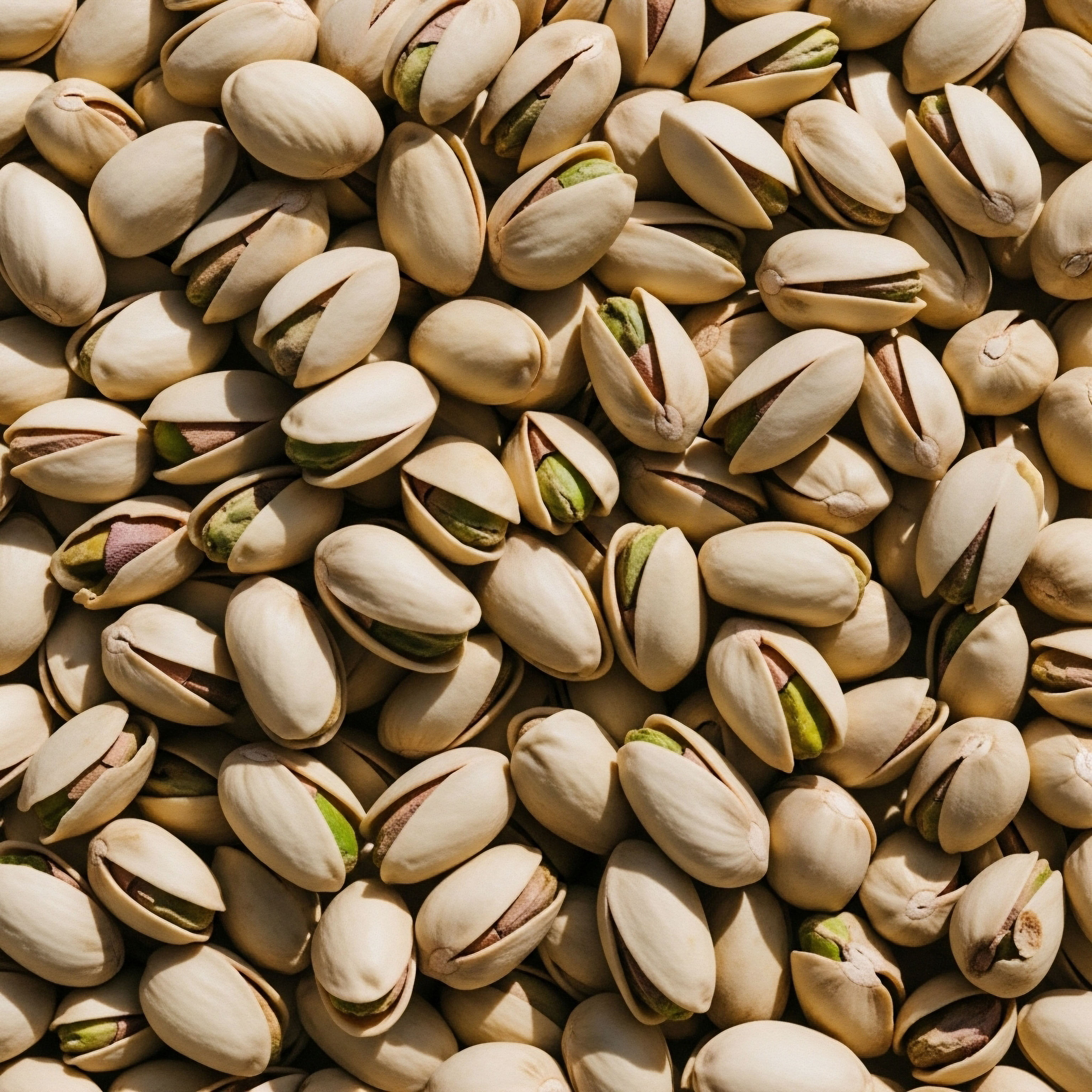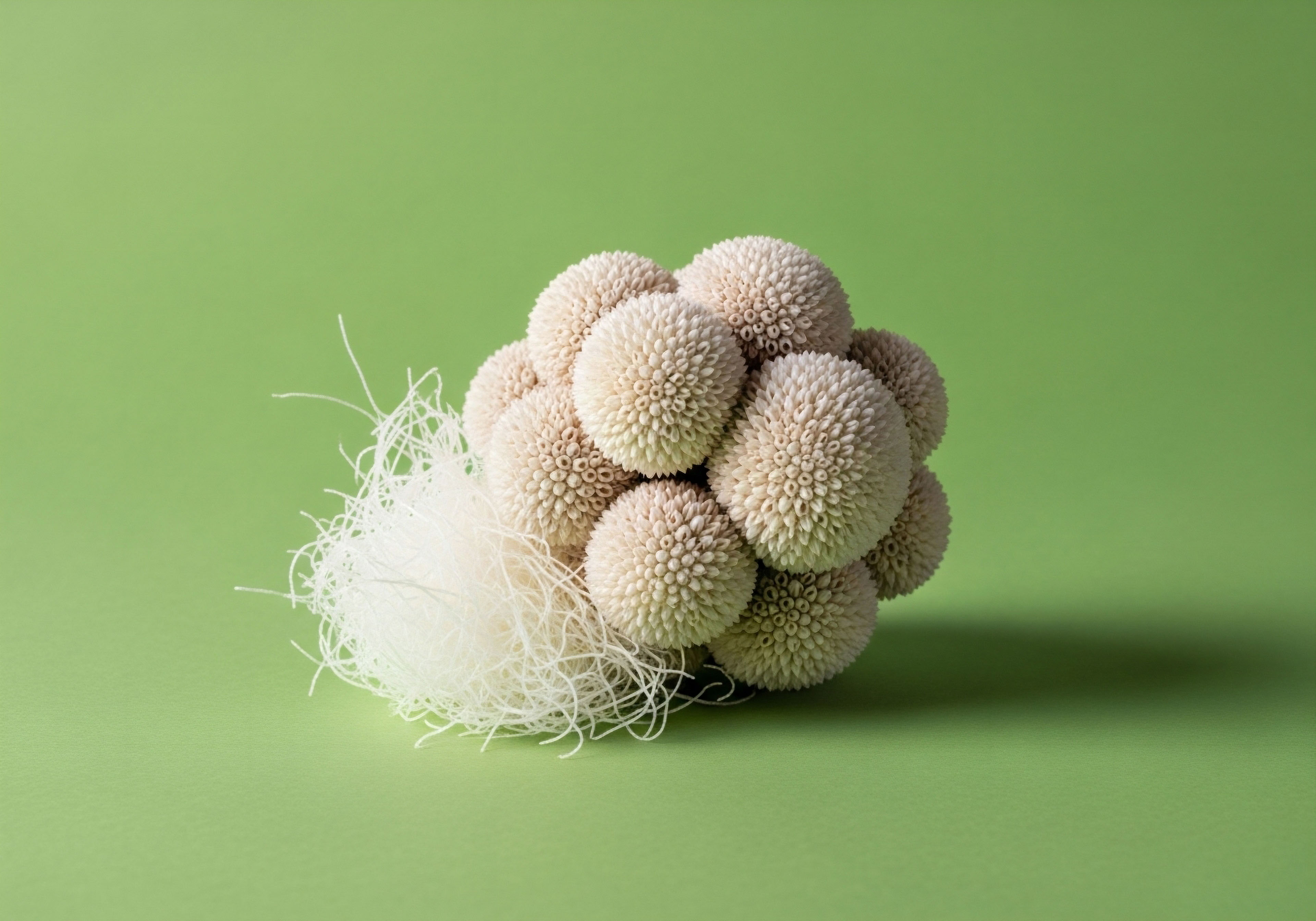

Fundamentals
The feeling of being at odds with your own body is a profoundly personal and often isolating experience. When you have Polycystic Ovary Syndrome (PCOS), this feeling can be a constant companion. You may be doing everything you are “supposed to do,” yet your body seems to have a different agenda.
This is a common narrative, and it is essential to understand that this is your body communicating a deeper imbalance. At the center of this communication is often a mechanism called insulin resistance, a key factor in how PCOS manifests and progresses.
Your body’s cells, which are meant to respond to the hormone insulin to manage blood sugar, are becoming less responsive. This prompts your pancreas to produce even more insulin, leading to a cascade of hormonal disruptions that contribute to the symptoms you may be experiencing, from irregular cycles to metabolic challenges.
Understanding this process is the first step toward reclaiming a sense of control and well-being. The conversation about managing PCOS begins with addressing this underlying insulin resistance. It is a biological reality that your body’s hormonal system is intricately connected to its metabolic health.
The way your body processes energy from food directly influences the hormones that regulate your reproductive system. Therefore, the most potent tool you have at your disposal is the food you choose to eat. A therapeutic diet in this context is a strategic approach to support your body’s systems, helping to restore balance and improve cellular communication. The goal is to create an internal environment where your body can function optimally, and you can feel your best.

What Is the Link between PCOS and Insulin Resistance?
Insulin resistance is a condition where cells in your muscles, fat, and liver do not respond well to insulin and cannot easily take up glucose from your blood. As a result, your pancreas makes more insulin to help glucose enter your cells.
For women with PCOS, this excess insulin can trigger the ovaries to produce more androgens, which are male hormones. This hormonal imbalance is a primary driver of many PCOS symptoms, such as irregular menstrual cycles, acne, and excess hair growth. The connection is so strong that managing insulin levels is a foundational aspect of managing PCOS.
By improving your body’s sensitivity to insulin, you can help to regulate hormone production and alleviate some of the most challenging aspects of the condition. This creates a positive feedback loop where better metabolic health supports better hormonal balance, and vice versa.
A balanced diet with low glycemic index foods can help stabilize blood sugar and insulin levels in women with PCOS.

The Role of Diet in Managing Insulin Resistance
Since insulin resistance is at the heart of many PCOS symptoms, a diet that helps to manage blood sugar and insulin levels can be a powerful intervention. The primary goal of a PCOS diet is to improve the body’s sensitivity to insulin. This involves making strategic food choices that prevent sharp spikes in blood sugar.
When blood sugar levels are more stable, the pancreas does not need to release large amounts of insulin. This, in turn, can help to lower androgen levels and improve the regularity of the menstrual cycle. The focus is on whole, unprocessed foods that are rich in nutrients and fiber, which help to slow down the absorption of sugar into the bloodstream.
This approach is about nourishing your body with the building blocks it needs to function properly while minimizing the foods that can exacerbate the underlying hormonal imbalances of PCOS.


Intermediate
For those already familiar with the basics of PCOS and insulin resistance, the next step is to explore the specific dietary protocols that have been shown to be effective. These are not merely diets in the traditional sense of weight loss, but rather therapeutic eating plans designed to address the unique metabolic and hormonal challenges of PCOS.
The effectiveness of these protocols lies in their ability to modulate the body’s insulin response, which, as we know, is a key lever in managing this condition. The choice of a specific protocol may depend on individual factors such as the severity of insulin resistance, personal preferences, and co-existing health conditions. It is always recommended to work with a healthcare provider or a registered dietitian to determine the most appropriate approach for your unique needs.
Three dietary protocols that have gained attention for their potential benefits in managing insulin resistance in PCOS are the low-glycemic-index diet, the ketogenic diet, and the Dietary Approaches to Stop Hypertension (DASH) diet.
Each of these approaches has a different mechanism of action, but they all share the common goal of improving insulin sensitivity and reducing the hormonal and metabolic consequences of PCOS. Understanding the principles behind each of these diets can empower you to make informed decisions about your nutritional strategy and to have more productive conversations with your healthcare team.
The following sections will provide a more detailed look at these dietary protocols, including their key features and the evidence supporting their use in the context of PCOS.

Low-Glycemic-Index Diet
The low-glycemic-index (GI) diet is a cornerstone of nutritional management for PCOS. The glycemic index is a measure of how quickly a food causes our blood sugar levels to rise. Foods with a high GI are rapidly digested and absorbed, causing a sharp increase in blood sugar and a corresponding surge in insulin.
In contrast, low-GI foods are digested and absorbed more slowly, leading to a more gradual rise in blood sugar and a more moderate insulin response. For women with PCOS, a low-GI diet can be particularly beneficial because it helps to avoid the dramatic blood sugar fluctuations that can worsen insulin resistance. This approach emphasizes whole grains, legumes, non-starchy vegetables, and most fruits, while limiting high-GI foods like white bread, sugary snacks, and processed cereals.
A low-carbohydrate diet is extremely helpful in losing weight and reducing BMR.

Ketogenic Diet
The ketogenic diet is a very low-carbohydrate, high-fat diet that has been studied for its potential to improve insulin sensitivity. By drastically reducing carbohydrate intake, the body is forced to use fat for fuel instead of glucose, a state known as ketosis.
This can lead to significant improvements in insulin resistance and weight loss, both of which are important for managing PCOS. A ketogenic diet for PCOS would typically involve limiting carbohydrates to less than 50 grams per day and obtaining the majority of calories from healthy fats like avocados, nuts, seeds, and olive oil, along with moderate protein.
While the ketogenic diet can be effective, it is also quite restrictive and may not be suitable for everyone. It is important to work with a healthcare professional to ensure that you are meeting your nutritional needs and to monitor for any potential side effects.

Dietary Approaches to Stop Hypertension (DASH) Diet
The DASH diet is an eating plan that was originally designed to lower blood pressure, but it has also been shown to be effective in improving insulin resistance. This diet emphasizes fruits, vegetables, whole grains, lean proteins, and low-fat dairy products, while limiting foods that are high in saturated fat, cholesterol, and sodium.
The DASH diet is rich in fiber, potassium, calcium, and magnesium, all of which are important for metabolic health. For women with PCOS, the DASH diet can be a balanced and sustainable approach to improving insulin sensitivity and reducing the risk of cardiovascular disease, which is elevated in this population. A key feature of the DASH diet is its focus on whole, unprocessed foods, which aligns with the general principles of a healthy diet for PCOS.
| Dietary Protocol | Key Principles | Potential Benefits for PCOS |
|---|---|---|
| Low-Glycemic-Index Diet | Focus on foods that have a minimal impact on blood sugar levels. Emphasizes whole grains, legumes, and non-starchy vegetables. | Improves insulin sensitivity, helps with weight management, and can regulate menstrual cycles. |
| Ketogenic Diet | Very low-carbohydrate, high-fat diet that induces a state of ketosis. | Can lead to significant weight loss and improvements in insulin resistance. |
| DASH Diet | Emphasizes fruits, vegetables, whole grains, and lean proteins, while limiting sodium and saturated fat. | Improves insulin sensitivity, lowers blood pressure, and reduces the risk of heart disease. |


Academic
From an academic perspective, the management of insulin resistance in Polycystic Ovary Syndrome (PCOS) is a complex interplay of endocrinology, metabolism, and genetics. The pathophysiology of PCOS is characterized by a vicious cycle of hyperinsulinemia and hyperandrogenism, where elevated insulin levels stimulate ovarian androgen production, and high androgen levels contribute to insulin resistance.
This creates a self-perpetuating cycle that drives the clinical manifestations of the syndrome. Therefore, therapeutic interventions that target insulin resistance are of paramount importance. While lifestyle modifications, including diet and exercise, are the first line of treatment, the specific dietary protocols employed must be evidence-based and tailored to the individual patient’s metabolic profile.
The choice of diet should be informed by a thorough understanding of the underlying mechanisms of insulin resistance in PCOS and the potential impact of different macronutrient compositions on insulin signaling pathways.
Recent research has shed light on the molecular mechanisms by which different dietary components can influence insulin sensitivity in the context of PCOS. For example, the type and amount of carbohydrates consumed can have a profound effect on postprandial glucose and insulin responses.
Low-glycemic-index carbohydrates are thought to improve insulin sensitivity by reducing the demand on the pancreas to produce insulin. In contrast, high-glycemic-index carbohydrates can exacerbate insulin resistance by causing rapid and excessive insulin secretion. The role of dietary fats is also a subject of ongoing investigation.
Monounsaturated and polyunsaturated fats, such as those found in the Mediterranean diet, have been shown to have anti-inflammatory effects and may improve insulin sensitivity. Conversely, saturated and trans fats can promote inflammation and worsen insulin resistance. The following sections will delve into the scientific evidence supporting the use of specific dietary protocols for managing insulin resistance in PCOS, with a focus on the underlying physiological and molecular mechanisms.

How Does a Low-Carbohydrate Diet Impact Hormonal Balance in PCOS?
Low-carbohydrate diets, including the ketogenic diet, have been shown to be effective in improving insulin sensitivity and promoting weight loss in women with PCOS. A meta-analysis of randomized controlled trials found that low-carbohydrate diets were associated with significant reductions in fasting insulin and improvements in hormonal parameters, including a decrease in testosterone levels.
The proposed mechanism of action is a reduction in the insulinotropic effects of carbohydrates, which leads to lower circulating insulin levels. This, in turn, reduces the stimulus for ovarian androgen production. Additionally, the weight loss that often accompanies a low-carbohydrate diet can further improve insulin sensitivity and hormonal balance. However, the long-term safety and efficacy of very-low-carbohydrate diets in women with PCOS require further investigation.
Low-carbohydrate, low fat diets were associated with decreased levels of circulating insulin, glucose and inflammatory markers which play a critical role in metabolic homeostasis, ovarian function and reduced androgens.

The Mediterranean Diet and Its Anti-Inflammatory Effects
The Mediterranean diet, which is rich in fruits, vegetables, whole grains, legumes, nuts, and olive oil, has been shown to have numerous health benefits, including improvements in insulin sensitivity and a reduction in inflammation. A study published in the journal Nutrients found that adherence to a Mediterranean diet was associated with lower levels of inflammatory markers and improved insulin resistance in women with PCOS.
The anti-inflammatory effects of the Mediterranean diet are thought to be mediated by its high content of monounsaturated fats, polyphenols, and fiber. These components can modulate inflammatory pathways and improve endothelial function, both of which are important for insulin sensitivity. The Mediterranean diet is a well-balanced and sustainable dietary pattern that can be a valuable tool for managing the metabolic and cardiovascular risks associated with PCOS.
- Monounsaturated fats ∞ Found in olive oil, avocados, and nuts, these fats can help to lower LDL cholesterol and reduce inflammation.
- Polyphenols ∞ These are plant-based compounds with antioxidant and anti-inflammatory properties. They are abundant in fruits, vegetables, and whole grains.
- Fiber ∞ A high-fiber diet can help to slow the absorption of sugar, improve gut health, and promote satiety.
| Dietary Protocol | Carbohydrates (% of total energy) | Protein (% of total energy) | Fat (% of total energy) |
|---|---|---|---|
| Standard American Diet | 50-60% | 15-20% | 30-35% |
| Low-Glycemic-Index Diet | 40-50% | 20-30% | 30-35% |
| Ketogenic Diet | <10% | 20-25% | 65-75% |
| DASH Diet | 55-60% | 15-20% | 25-30% |
| Mediterranean Diet | 40-50% | 15-20% | 35-40% |

References
- Zhang, X. et al. “Low-carbohydrate diets for polycystic ovary syndrome ∞ a meta-analysis of randomized controlled trials.” Journal of Ovarian Research, vol. 12, no. 1, 2019, p. 29.
- Moran, L. J. et al. “Dietary composition in the treatment of polycystic ovary syndrome ∞ a systematic review to inform evidence-based guidelines.” Journal of the Academy of Nutrition and Dietetics, vol. 113, no. 4, 2013, pp. 520-545.
- Asemi, Z. et al. “The effect of DASH diet on insulin resistance and metabolic profiles in women with polycystic ovary syndrome ∞ a randomized clinical trial.” Roczniki Państwowego Zakładu Higieny, vol. 66, no. 3, 2015, pp. 225-231.
- Barrea, L. et al. “Adherence to the Mediterranean diet, dietary patterns and body composition in women with polycystic ovary syndrome (PCOS).” Nutrients, vol. 11, no. 10, 2019, p. 2278.
- Che, X. et al. “The effect of a low-carbohydrate diet on the treatment of polycystic ovary syndrome ∞ a meta-analysis of randomized controlled trials.” International Journal of Endocrinology, vol. 2021, 2021, p. 5582315.

Reflection
The information presented here is a starting point, a map to help you understand the terrain of your own body. The journey to hormonal balance is a personal one, and the most effective path is the one that is tailored to your unique biology and lifestyle.
The knowledge you have gained is a powerful tool, but it is the application of that knowledge that will make the difference. As you move forward, consider how this information resonates with your own experiences. What are the small, sustainable changes you can make today that will support your body in the long run? The path to wellness is a process of discovery, and you are the lead investigator in the fascinating study of you.



